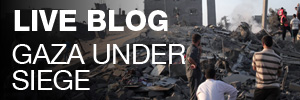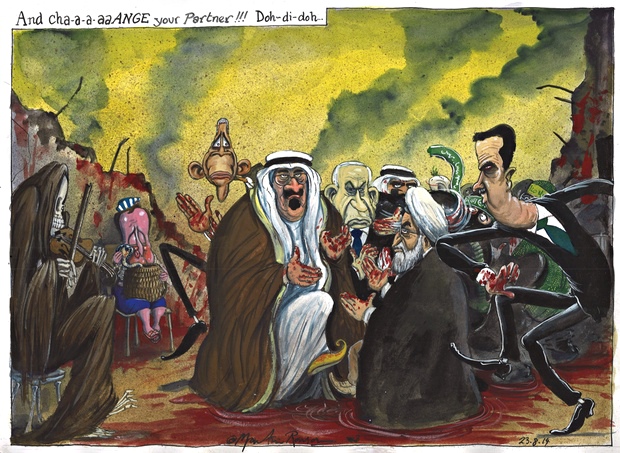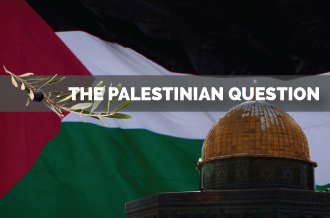Saturday, August 23, 2014
Hamas leader: Don't compare us to ISIL
Must Watch
-
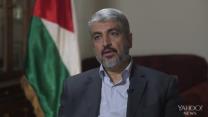 NOW WATCHINGTop Hamas Leader condemns comparison to ISIL147,200 views
NOW WATCHINGTop Hamas Leader condemns comparison to ISIL147,200 views - 2
UP NEXT
Savoy - Savoy LIVE Concert10,000 views - 32014 VMAs: Girls on the Red Carpet19,600 views
- 4‘Ice Bucket Challenge’ Raises Millions20,800 views
- 5Iggy Azalea - A.K.A. Iggy Azalea8,200 views
- 6
 Matt Nathanson - I Wanna Dance With Somebody - Live from the House of Blues Cleveland #YahooLive9,000 views
Matt Nathanson - I Wanna Dance With Somebody - Live from the House of Blues Cleveland #YahooLive9,000 views - 7
 Iggy Azalea’s Amusing Reaction to Her VMA Nominations55,400 views
Iggy Azalea’s Amusing Reaction to Her VMA Nominations55,400 views - 8
 Bill & Melinda Gates Foundation Pledge Up to $1 Million Dollars to DonorsChoose344,500 views
Bill & Melinda Gates Foundation Pledge Up to $1 Million Dollars to DonorsChoose344,500 views - 9Guilty toddler denies eating chocolate donut279,100 views
- 1052 Unbelievable Video Game Things At The World's Best Video Game Store4,300 views
DOHA, Qatar—In an interview with Yahoo News, the political leader of Hamas today vigorously rejected any comparison to ISIL terrorists and pledged that the Palestinian militant group will start giving warnings to Israelis about impending rocket attacks in order to avoid the killing of innocent civilians.
As much of the world expressed revulsion over the beheading of American journalist James Foley by an ISIL executioner, Hamas political chief Khaled Meshaal took pains to distance his organization from the Islamist militant group that has conducted a murderous rampage across a large swath of Syria and Iraq.
"This is an opportunity for me to say we are against the killing of any civilians, any journalists," Meshaal said in the interview. But he then turned the accusation against Israel. "The question is who is killing the civilians," he said, asserting that more than 15 journalists have been killed during the Israeli assault on Gaza.
Meshaal acknowledged for the first time that Hamas members — but not the group's political leadership — were behind the slaying of three Israeli settlers on the West Bank in June. But he defended the murders as a legitimate action against Israeli "illegal" occupation.
"We were not aware of this action taken by this group of Hamas members in advance," he said. "But we understand people are frustrated under the occupation and the oppression, and they take all kinds of action."
When asked directly whether Hamas members carried out the abduction of the Israeli teens, Meshaal said: "We learned about these confessions from the Israeli investigation … Hamas political leadership was not aware of all these details. We learned about it later on …
"Our view is that soldiers and settlers on the West Bank are aggressors, and they are illegally living in this occupied and stolen land. And the right to resist is the right of Palestinians."
The hourlong interview was conducted at a gated, unmarked Hamas media office in Doha, Qatar. It came after two days of talks there between Meshaal and Palestinian President Mahmoud Abbas at the sprawling palace of Qatari Emir Tamim bin Hamad al-Thani following the collapse of a 10-day cease-fire and the resumption of Hamas rocket fire and Israeli airstrikes in Gaza.
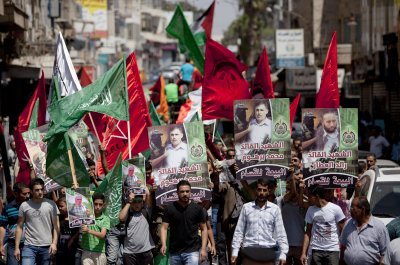
CLICK IMAGE for slideshow: Supporters of Hamas hold posters of three senior commanders of the Hamas military wing, …
In the wide-ranging interview, Meshaal repeatedly blamed Israeli leaders for the current round of violence. He deflected questions about the hundreds of Hamas rockets aimed at Israel, making a new pledge to warn civilians in advance of the attacks.
"We do not target civilians, and we try most of the time to aim at military targets and Israeli bases," Meshaal said. "But we admit that we have a problem. We do not have sophisticated weapons. We do not have the weapons available to our enemy … so aiming is difficult. We do promise you, though, that we will try in the future and we will warn people … We have given warnings to Israeli civilians. We promise that if we get more precise weapons, we will only target military targets."
Asked about Israeli Prime Minister Benjamin Netanyahu’s comments this week that "Hamas is like ISIS, ISIS is like Hamas," Meshaal called the comparison a "lie" designed to "trick" the American public.
"We are not a religious, violent group," Meshaal said, calling ISIL (the Islamist militant group also known as ISIS) a "totally different phenomenon. We are fighting against aggression in our land."
Mourning Gaza
Who and how will mourn and honour the slaughter of Palestinians in Gaza?
| ||||||
|
| ||||||

Relatives of seven-month-old Ali Deif hold his body as they mourn during the funeral of both the child and his mother in Jabalia, in the northern Gaza Strip [AFP]
| ||||||
| In Peter Paul Rubens' "Massacre of the Innocents" (1636-1638), we see a European artist's rendition of the Biblical story of infanticide by Herod the Great, the Roman-appointed King of Palestine as recorded in the Gospel of Matthew. Rubens was not the first artist, or the last, to depict this key narrative in the history of Christianity. In each artistic rendition the European Christianity mourns an inaugural moment in the traumatic birth of its tragic beginning. That mourning - and its successive showing and telling - is ennobling, sacerdotal, configurative with the history of a world religion. From this definitive story in the history of Christianity we can cut to Picasso's "Guernica" (1937) where we see the story of a perfectly historical, contemporary, and brutish bombing of Guernica, a Basque village in northern Spain, by German and Italian warplanes during the Spanish Civil War.The painting marks the elegiac remembrance of a horror that enables the Spanish and by extension the European who have stood in front of that work to mourn the slaughter of innocent people closer to their time and history. Different cultures may mourn differently - by public rituals, by works of art, passion plays, ceremonious performances of poetry, religious commemorations - but mourning they do, as an act of redemption. Through acts of mourning, cultures reconstitute themselves, gather their courage and collect their bearing, to face the unknown, the frightful future.
That particular carnage had any number of other enduring tragic, literary, and poetic memorials: the suicide of the Lebanese poet Khalil Hawi (1919-1982), the writing and subsequent publication of Elias Khoury's novel Gate of the Sun, Jean Genet's meditative jeremiad "Quatre heures a Chatila" ("Four Hours in Shatila"),Mahmoud Darwish's poem "In the Presence of Absence", Adania Shibli's novella Touch, and many other landmark works. People need time and meditative tenacity to mourn, to reconfigure themselves, to collect the remnants of the memory of those they love and have now lost, soon after or in fact as they collect their remains from the rubbles that brutish violence of murderers have made of their lives, before they burry them for the eternity that is their sorrow - whether in Guernica or in Sabra and Shatila, or now, perforce, in Gaza. Mourning restores the dignity of a people, locates them back on the moral map of their being. Mourning Gaza Who would be the Rubens or Picasso or Mahmoud Darwish of our time - what would be their artistic medium, with which they would remember, recollect, mourn, and honour the slaughter of Palestinians in Gaza in 2014? As we see the current slaughter of Palestinians in Gaza, and as the internet is flooded with pictures of dead children, an obvious question is who and how and by what manner will show and tell the moral and psychological terror of this latest moral depravity? Who will craft a memorial sanctuary for the Palestinians who have lost their loved ones, and by extension for other Palestinians whose homeland is being destroyed and stolen from under their feet, and by further extension the 1.3 billion Muslims, and even more millions of non-Muslims who bear witness to their suffering and endurance? Who will draw, paint, write, sing, dance, film, stage, or recite the deaths of these Palestinians - and thus hold us together as we mourn? Will the military generals, the zealot ideologues, write their history too, or will the maimed, the murdered, the dispossessed, the robbed, the wronged, the imprisoned, the weakened, and the vilified have their say too? That telling is not merely for the historical record. It is, more immediately, to allow for the momentary pause of mourning that restores a sense of self-assuredness, of quietude, of an intuition of transcendence that defines a people. This last slaughter of Gaza has not made the Palestinian cause a global cause, for it always was. But something else has happened this time around. The lightweight of the Palestinian children murdered by the Israeli death machine bears too heavily on the conscience of the globe. Consider a noble, simple, and yet so astonishingly powerful act of mourning for the Palestinian children by a few mothers in Iceland, which I hold more significant than even the massive rallies mounted by millions of people around the globe. "In the tiny village Isafjordur in Iceland, a few women who were fed up and horrified by the news of bloodshed and killings in Gaza, Palestine, got together and held a very symbolic demonstration in the plaza of their home town. They gave a little speech and read some poetry to a relatively big crowd that had gathered to take part." In the middle of the village, these good women put up clothes lines in an empty plaza on which they hung children's clothes and asked others to do the same. "In the end the demonstrators had hung up about 400 pieces of clothes - one for each child killed in the Israeli bombings on Gaza in July-August 2014." "That's more children than attend the children's school in our village," one of the participants noted. "Hanging clothes on a line is an act of caring, something a parent does for the family." But here on this occasion that caring common act has become a universal act of mourning, by a people farthest removed from Palestine and the brutish violence visited upon them for decades. These hanging children's clothing items have become floating signifiers. They must have clothed the children of caring parents, but they have now left those bodies and come here, hanging, representing something else. In her loving obituary to Jacques Derrida, Judith Butler notes, "his own writing constitutes an act of mourning . . . it is not his own death that preoccupies him [when he writes on his contemporary thinkers who had died before him] but rather his 'debts'. These are authors that he could not do without, ones with and through whom he thinks. He writes only because he reads, and he reads only because there are these authors to read time and again." Mourning here, between Butler and Derrida, as between Derrida and the thinkers he knew and mourned becomes an act of public acknowledgement of debt, of paying a debt publicly, a debt of gratitude, as in without you I could not think. In Gaza, we mourn not thinkers and texts, but babies and their parents. We mourn the nascent moments when children could become thinkers and their fears and dreams their unwritten texts, unpainted canvases, unsung poems: A list of their names is now all that has remained: Ahmed Nael Nizar Mahdi, 16, male, Hanaa Mohamed Fouad Yousef Malka, 27, female, Qassem Jabr Edwan Awda, 11, male, Aseel Ibrahim Fayeq Al Masri, 16, female, Abdalla Ramadan Jameel Abugazal, 4, male. . . . Those empty hanging clothing items in that village in Iceland hold the ghosts of our thinkers' past, the death of our thinkers future, and the phantoms of our dumbfounded bewilderment now. Mocking those murdered souls, Zionists put ads in civilised people's newspapers to laugh and snicker at the dead bodies of Palestinian children from the cockpit of Israeli fighter jets, funded by the selfsame purses that purchase those white pages of very civilised European democracies to celebrate their freedom of expression and mark our barbarity, stage our savage moments of mourning. Will this civilisation they advertise last - should it? Where should we savages go to mourn our murdered children, to bury the bones of our slaughtered elders, to build a monument for our fallen heroes? Is there an outside-text to the green pastures of these civilised people, any barren desert at all outside the fruitful texts of their democracies, as I hear the suddenly interrupted cries of a murdered Palestinian child? | ||||||
Friday, August 22, 2014
أبو مرزوق: جهود دولية لوقف النار ولا تهدئة

أكدّ الدكتور موسى أبو مرزوق عضو رئيس المكتب السياسي لحركة حماس، أن الفصائل الفلسطينية أجمعت على أنه لا عودة لاتفاق تهدئة مع (إسرائيل)، مشيرًا إلى جهود دولية أوروبية بهدف وقف إطلاق النار.
وقال أبو مرزوق في برنامج عبر قناة الجزيرة، مساء الجمعة، إن الفصائل وقعت على دعوة تطالب رئيس السلطة محمود عباس بالتوجه إلى محكمة الجنايات الدولية، متوقعًا أن يستجيب الأخير وينفذ ذلك خلال أيام.
وأكدّ أن المقاومة جربت خيارات التهدئة مع (إسرائيل) أكثر من مرة دون جدوى، مشيرًا إلى أن الاحتلال استغلها لإعادة ما سماه بنك الأهداف. وأضاف: "إسرائيل لا تفهم إلا لغة القوة، المقاومة ماضية في المواجهة وحرب الاستنزاف حتى تحقيق مطالبها".
وتابع أبو مرزوق: "المقاومة تواصل قصف المستوطنات الإسرائيلية، وهي مستمرة في تصنيع صواريخها"، مؤكدًا في الوقت ذاته أن نهايات المواجهات تبلورها السياسة ولا يوجد حرب لا تنتهي إلا عبر ذلك.
وأكدّ أن حماس تسعى إلى إيجاد برنامج سياسي موحد يرتكز على مقاومة الاحتلال، داعيًا إلى ضرورة العمل على التوصل لهذا البرنامج كي يتسنى الاستمرار في مواجهة (إسرائيل) حتى تحرير القدس والأرض الفلسطينية.
Syria: One Year On, No Justice for Chemical Attacks Victims
Hundreds Died in Deadliest Such Event in 25 Years
Human Rights Watch

Human Rights Watch

(New York) – Justice remains elusive for the victims of the chemical weapons attacks on Ghouta, near Damascus, which killed hundreds of people, Human Rights Watch said today, on the anniversary of the August 21, 2013 attacks.
The attacks were the most significant use of chemical agents since the Iraqi government under Saddam Hussein, who used them in an attack on Iraqi Kurds in 1988, but no one has been held to account. Available evidence strongly suggests that Syrian forces carried out the attacks, though the government denies responsibility. Subsequently, under considerable international pressure, Syriaacceded to the Chemical Weapons Convention and agreed to eliminate its chemical weapons.
“Important though it is, the removal of chemical weapons from Syria’s arsenal will do nothing for the hundreds of victims who died a year ago and the relatives who survive them,” said Nadim Houry, deputy Middle East and North Africa director at Human Rights Watch. “Closure of the chemical weapons issue in Syria will be possible only when those who ordered and executed the Ghouta attacks have been held to account and are behind bars.”
The UN Security Council unanimously adopted a resolution on September 27, 2013, requiring Syria to eliminate its chemical weapons and allow access to weapons inspectors. On June 23, the Joint Mission of the Organization for the Prohibition of Chemical Weapons and the United Nations charged with removing Syria’s chemical weapons material announced that their task was complete.
However, international efforts to ensure credible justice for these and other ongoing grave human rights crimes in Syria have proved elusive. On May 22, Russia and China blocked a UN Security Council resolution that would have referred the situation in Syria to the International Criminal Court (ICC). Over 100 nongovernmental organizations urged the Council to approve the resolution, more than 60 countries co-sponsored it, and 13 of the Council’s 15 members voted for it.
Broad support for the resolution from governments and nongovernmental groups alike reflects the widespread international determination to achieve justice for serious crimes in Syria. Governments that supported that effort should remain committed to seeking justice for victims in Syria, whether in the Security Council, UN General Assembly, UN Human Rights Council, or through other avenues, including the use of universal jurisdiction, Human Rights Watch said.
Photo essay, graphic images:
ALSO AVAILABLE IN:
حماس: قمع مسيرات الضفة يخدم الاحتلال
أكدت حركة المقاومة الاسلامية "حماس" أن قمع السلطة الفلسطينية لمسيرات التضامن مع غزة في الضفة عمل مخجل ومشين لا يخدم سوى الاحتلال (الإسرائيلي).
وقالت الحركة على لسان المتحدث باسمها فوزي برهوم: "يجب أن يتوقف القمع فورا وندعو لاستمرار المظاهرات والاشتباكات مع العدو في كل مدن فلسطين".
وقمعت أجهزت سلطة رام الله المسيرات التي خرجت اليوم بعد صلاة الجمعة، نصرةً لغزة ومقاومتها.

وقال شهود عيان لـ "الرسالة نت" إن مسيرة حاشدة انطلقت في المدينة عقب صلاة الجمعة متوجهة إلى منطقة باب الزاوية، لكن المشاركين فوجئوا بأعداد كبيرة من أجهزة السلطة تمنعهم من الوصول إلى منطقة تواجد قوات الاحتلال، وأطلقت صوبهم الغاز المسيل للدموع؛ ما أدى إلى تسجيل حالات اختناق.
وأضاف الشهود بأن الشبان رشقوا عناصر الأمن بالحجارة والألعاب النارية، وهتفوا ضدها بعبارات استنكارية لموقفها من المسيرات التضامنية مع قطاع غزة.
Thursday, August 21, 2014
The outlaw state of Israel, part II
Unconditional US support for the state of Israel has precluded a peace settlement and destabilised the Middle East.
Last updated: 21 Aug 2014 13:33
| ||||||||||||
| ||||||||||||
|
| ||||||||||||

The Obama administration has increased the aid to Israel through its reliance on various special appropriations, write Falk and Ganji [EPA]
| ||||||||||||
| In Part I of this article we described the reasons as to why Israel has become an outlaw state. In this part we discuss US support for Israel and its consequences. The US as Israel's servant The United States has supported Israel without reservations since its founding in 1948. According to an agreement between the two countries, that has become a law in the US, the US has committed itself to preserve Israel's strategic and military superiority in relation to other countries in the Middle East. From 1949 till today, the US has provided Israel with nearly $122bn in aid, calculated by reference to fixed dollars. Counting the aid to Israel in 2003 dollars, from 1949 - 2003 the US has provided Israel with $140bn worth of military assistance, which has been increasing since 2003. The basic annual commitment to Israel is $3.1bn, which is far more than military aid that has been given to any other country in the world, and this figure is an understatement, hiding a variety of supplemental appropriations and other benefits accorded uniquely to Israel. In effect, the US has been subsidising Israel's aggressions, and ignoring military assistance legislation that seeks to withhold such aid to countries that are not acting defensively and in accordance with international law. The Obama administration has even increased the aid to Israel through its reliance on various special appropriations. Most recently Congress appropriated an additional $225m for further development of the Iron Dome derence system. The US Senate has even approved a resolutionaccording to which if Israel attacks Iran's nuclear sites in the future defying international law, the US is obligated to help Israel. It reads in part, "If the Government of Israel is compelled to take military action in legitimate self-defense against Iran's nuclear weapons program, the United States Government should stand with Israel and provide, in accordance with United States law and the constitutional responsibility of Congress to authorize the use of military force, diplomatic, military, and economic support to the Government of Israel in its defense of its territory, people, and existence." Of course, the language as written of "legitimate self-defence" is understood to mean any action taken by Israel that is alleged to be "defensive", whether or not in conformity to international law, which limits such claims to situations of response to prior armed attacks. Among the many UNSC resolutions that seek to criticise or condemn Israel for its actions against the Palestinians, almost all have been vetoed by the US. In fact, the US government opposes virtually every resolution approved by any UN organ, including UN Human Rights Council (UNHRC), if it is deemed to be critical of Israel, and this includes even initiatives to establish fact-finding commissions of inquiry to determine whether charges of war crimes are well-founded. When Israel attacks the defenceless and completely vulnerable Palestinian people, the US justifies such high-intensity and disproportionate violence as "self-defence", obstructs the issuance of a UN call for an immediate ceasefire, and gives diplomatic and material aid and comfort to Israeli aggression from start to finish. After the fact-finding "Goldstone Report" on Israel war crimes in Gaza in 2008-2009 was approved by UNHRC, the US and Israel successfully intervened with the Secretary General to prompt him to urge the non-implementation of the report in relation to Israeli accountability for war crimes. The US government also used its leverage to prevent even the discussion of this important report in the UNSC. When recently, the UNHRC approved a resolution to investigate Israel's war crimes in Gaza, the US cast the only negative vote. Amnesty International has reported that the evidence of systematic attacks by Israel's military forces on schools and hospitals in Gaza during the current warfare is overwhelming. It includes targeting civilians who have sought shelter from Israeli attacks in United Nations schools and other buildings marked with the UN logo. Human Rights Watch has reported on evidence of intentional shooting of Palestinians who were fleeing their homes, even after they had been ordered to do so by Israel's military, and has declared such behaviour to be a war crime. We can only comprehend this partisan pattern of US policy toward Israel by taking account of the leverage exerted on the government by the formidable lobby working on behalf of Israel known. Former President Jimmy Carter and the former President of Ireland and former Head of the UNHRC Mary Robinson have condemned this one-sidedness of US policy toward Israel and Hamas, insisting that as a first step Israel immediately ends without conditions the blockade of Gaza, allowing the people of Gaza to have finally some semblance of a normal life. Consequences The US policy toward Israel has had dire consequences: It has completely discredited the US government's claim to act as an impartial arbitrator between Israel and the Palestinians. Hatred and resentment toward the US has been increasing throughout the region, not only because of its blind support of Israel, but also because of its military onslaughts against Iraq, Libya, and Afghanistan, and drone attacks in Pakistan, Yemen, Somalia, and elsewhere.
What Israel has done in the region with the support of the US has contributed greatly to the growth of extremism and discord throughout the Middle East. If such policies are not reversed even more chaos, extremist violence, bloodshed, and devastation are likely to emerge in the future. The Middle East and North Africa have been unstable for decades, and the consequences of the intensifying instability are spreading to other regions and endangering world peace. These policies of unconditional support for Israel are going against the US national interests. The Palestinian-Israeli conflict is the mother of all problems in the Middle East. Israel has undermined all efforts to find a peaceful solution by way of diplomacy. It has rejected both the Arab Initiative of 2002 and the roadmap proposed by the Quartet - the US, Russia, the European Union, and the UN - which require Israel to withdraw to its pre-1967 borders with the expectation that a sovereign and independent Palestinian state would emerge. What is required of Israel as a precondition for peace - set forth in Security Council Resolution 242 and reaffirmed since its unanimous adoption in 1967 - enjoys support worldwide. It should be understood that ending the occupation of the Palestinian territories is not by itself sufficient to achieve a sustainable peace. Of paramount importance is also some arrangement that acknowledges the rights of several million Palestinian refugees who were forcibly expelled over the course of many years from Israel, most dramatically in the 1948 Nakba, the Palestinian national catastrophe. There are also serious questions at this time as to whether the two-state solution is a viable and desirable goal, if it ever was. The question of Palestinian self-determination as the proper foundation for a sustained just peace is more open to debate and reflection in 2014 than ever before. Israel's expansionism has put the international two-state consensus under question, and the international community, along with representatives of the Palestinian people must now consider new ways to achieve a just peace for both peoples, which cannot be realised without upholding Palestinian rights. We believe that a crucial step in this direction is the widespread acknowledgement that Israel has become an outlaw state, and that appropriate adjustments to this reality must be made. Richard Falk is Albert G Milbank Professor Emeritus of International Law at Princeton University and Research Fellow, Orfalea Center of Global Studies. He is also Former UN Special Rapporteur on Palestinian human rights. Follow him on Twitter: @rfalk13 Akbar Ganji is one of Iran's leading political dissidents and has received over a dozen human rights awards for his efforts. Imprisoned in Iran until 2006, he is the author of The Road to Democracy in Iran, which lays out a strategy for a non-violent transition to democracy in Iran. Follow him on Twitter: @GanjiAkbar | ||||||||||||
Subscribe to:
Posts (Atom)












